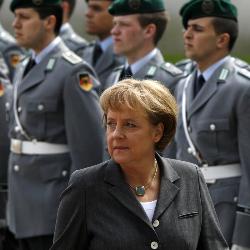Putin May Boost Russia’s Power as Iceland Seeks Loan (Update3)
Rusia busca como expandir su poder económico ayudando a miebros de la OTAN. EEUUy Europa ya no pueden mas!
Para la traduccion al español, presiona aqui.
Despues que el Banco de Finlandia, buscase ayuda con sus aliados y le fuese negada, ahora Rusia evalua si ayuda o no a este miembro de la OTAN.
By Henry Meyer
Oct. 8 (Bloomberg) — For Russian Prime Minister Vladimir Putin, the financial crisis that is costing his government $200 billion may also provide an unexpected opportunity to expand his country’s influence.
Rejected by its Western allies, Iceland yesterday said it was in talks to borrow 4 billion euros ($5.4 billion) from Russia to shore up its financial system. It would be the first time Russia has extended financial assistance to a NATO country.
“This is a case of using foreign aid to pursue geopolitical objectives,” said Chris Weafer, chief strategist at UralSib Financial Corp. in Moscow. “This is good economics because it shows Russia’s in a strong financial position: it can afford to lend 4 billion euros to someone else.”
Even with the ruble near an 18-month low and the stock market suffering its worst rout since the 1998 default, Russia has weathered the global credit crunch with $563 billion in currency reserves, the world’s third-largest amount. That financial muscle is giving Putin a weapon to challenge the U.S., which is grappling with its worst financial crisis since the Great Depression.
Iceland sought the loan after taking control of two of the country’s largest banks and lending 500 million euros to a third. The request comes as the country’s financial system is near collapse.
`Very Big Help’
“If it goes through, this will be a very, very big help for us,” said central bank chief David Oddsson, who complained that other European nations had failed to rescue Iceland.
“We haven’t got so much help from our very good friends in the Western hemisphere; this decision by the Russian government to take up negotiations is very much welcome,” Oddsson told Bloomberg Television. Russian Finance Minister Alexei Kudrin said Russia’s reaction to the request was “positive.”
Ordinary Icelanders, whose country for decades hosted a U.S. airbase, seemed grateful, too.
“Iceland is turning into the little Cuba of the north,” said Ragnar Hannes Gudmundsson, 38, a former bank employee who is now a teacher. “The Soviet Union supported Cuba decades ago and now they are saving us.”
Russia’s ability to dip into its reserves — it has pledged almost $200 billion to boost liquidity and reduce borrowing costs — is in stark contrast to the situation it faced nine years ago: Reserves then stood at just $12.5 billion.
Default and Devaluation
When Putin took over as president on Dec. 31, 1999, he inherited a government that had defaulted on $40 billion of debt and devalued the ruble in August 1998, wiping out millions of people’s savings and pushing Russia to the edge of bankruptcy.
Since then, the economy has grown almost 7 percent a year on average, fueled by high oil prices. Now, the prospects for Russia are clouding as crude prices fall on concern of a global economic slowdown. Oil futures have declined about 40 percent from the record $147.27 reached July 11. Russia depends on oil and gas for more than two-thirds of its export earnings.
Russia halted trading today on its stock markets after the ruble-denominated Micex Index slumped 14 percent in the first 35 minutes of trading and the dollar-denominated RTS Index plunged 11 percent in the first half hour. The RTS has dropped two-thirds this year, the sixth-worst among 88 national equity indexes tracked by Bloomberg, a sell-off exacerbated by the five-day war in Georgia in August. Russian President Dmitry Medvedev yesterday announced $36 billion of loans for banks on top of a $150 billion support package pledged in September for companies and lenders.
Demonstrating Influence
If Russia can support its stock market and preserve growth, the current financial crisis represents a chance to demonstrate “influence in the world economy and the diminishing influence of the U.S,” said Sergei Markov, an adviser to the Kremlin who is a lawmaker in the ruling United Russia party.
Both Putin, 56, and Medvedev, 43, have criticized the U.S. for spreading financial contagion around the world.
U.S. “irresponsibility” led to the global credit squeeze, which may reduce Russian growth to as little as 5.7 percent this year, according to the finance ministry, Putin told a cabinet meeting Oct. 1.
A day later, Medvedev said at a forum in St. Petersburg that the financial crisis showed that the time when one economy and one currency dominated the world economy was “over.”
Former U.S. Treasury Secretary Larry Summers said the talks on a loan between Iceland and Russia highlighted a weakening role for the U.S.
“I have to say that the news on today’s Bloomberg that Iceland was negotiating a $5.4 billion stabilization loan with Russia did not fill me with a sense of comfort about the political implications and the ways in which the world is moving,” Summers said yesterday at a seminar in Buenos Aires.
Medvedev Speech
Medvedev today repeated calls for talks on the global financial crisis to include major developing nations.
“It’s obvious that economic egoism is the consequence of a unipolar world” led by the U.S., Medvedev told an international conference hosted by French President Nicolas Sarkozy in Evian, France.
Russia, which belongs to the Group of Eight club of industrialized countries, has argued for the body to expand. Russia hosted a summit of the so-called BRIC countries, along with Brazil, India and China, in May as part of an effort to develop them as an economic and political counterweight to the U.S. and Western Europe.
“The world is changing to Russia’s benefit,” said Markov, who heads the Institute of Political Studies in Moscow. He added that by lending to Iceland, Russian leaders also wanted to counter the damage to their country’s reputation in the West from the conflict with U.S.-allied Georgia.
To contact the reporter on this story: Henry Meyer in Moscow at hmeyer4@bloomberg.net
Last Updated: October 8, 2008 08:03 EDT
Archivado bajo: Uncategorized | No hay comentarios »
La crisis financiera no deja a ningun pais a salvo. Ahora tambien Islandia.
Primer Corralito Financiero en el banco “Icesave” de Islandia

Archivado bajo: Uncategorized | No hay comentarios »
Retirement account losses near $2 trillion. Financial crisis forcing workers to delay their golden years
Fondo de Pensiones de USA pierde cerca de dos trillones.
Crisis financiera obliga a Trabajadores a retrasar su jubilación
(Para ver una traduccion al español de este articulo presiona aqui)
Este articulo en ingles nos enseña como la crisis financiera, la cual es imparable, afectara en un futuro cercano a millones de pensionados en los EEUU y Europa.
WASHINGTON - Americans’ retirement plans have lost as much as $2 trillion — or about 20 percent overall — in the past 15 months, Congress’ top budget analyst estimated Tuesday.
The upheaval that has engulfed the financial industry and sent the stock market plummeting is devastating workers’ savings, forcing people to hold off on major purchases and consider delaying their retirement, said Peter Orszag, the head of the Congressional Budget Office.
As Congress investigates the causes and effects of the financial meltdown, the House Education and Labor Committee was hearing from retirement savings and budget analysts on how the housing, credit and other financial troubles have battered pensions and other retirement funds, which are among the most common forms of savings in the United States.
“Unlike Wall Street executives, America’s families don’t have a golden parachute to fall back on,” said Rep. George Miller, the panel chairman. “It’s clear that their retirement security may be one of the greatest casualties of this financial crisis.”
More than half the people surveyed in an Associated Press-GfK poll taken Sept. 27-30 said they worry they will have to work longer because the value of their retirement savings has declined.
Orszag indicated the fear is well-founded. Public and private pension funds and employees’ private retirement savings accounts have lost some 20 percent overall since mid-2007, he estimated. Private retirement plans may have suffered slightly more because those holdings are more heavily skewed toward stocks, Orszag added.
“Some people will delay their retirement. In particular, those on the verge of retirement may decide they can no longer afford to retire and will continue working,” Orszag said.
A new AARP study found that because of the economic downturn, one in five workers 45 and older has stopped putting money into a company-sponsored retirement account, Individual Retirement Account (IRA) or other retirement savings account during the past year, and nearly one in four has increased the number of hours he works.
Archivado bajo: Uncategorized | Etiquetado: eeuu, europa, quiebra, street, wall, bancarota, financiera, jubilacion, fondo, pensiones, crisis, millonarios | No hay comentarios »
La Mision de Todos: DESENMASCARAR a los verdaderos sembradores del terror en este planeta TIERRA
YA no podemos seguir callando y no hacer nada. La historia te condenara si no haces nada! Divulga! Haz correr esa verdad que ya conoces! Que mas pruebas quieres?
Archivado bajo: Uncategorized | No hay comentarios »
La crisis economica es inparable. Alemania se alista para aplicar la Ley Marcial!
Alemania se prepara en caso de tener que instalar la Ley Marcial
Alemania con la excusa de la lucha contra el terrorismo, plantea que quiere sacar al ejército a las calles para patrullar como ya hizo Italia hace unos meses. En fin, esto empieza a oler a ley marcial y a revueltas sociales por culpa del próximo e inevitable colapso económico a nivel mundial.
Esta es la noticia.
El Gobierno alemán aseguró ayer que es necesario cambiar la Constitución y dar mayores poderes al Ejército para luchar contra el terrorismo, incluyendo la capacidad de derribar aviones de pasajeros que sean secuestrados.
La Corte Suprema de Alemania rechazó hace dos años una ley que permitía derribar aviones secuestrados por lo que el tema ha provocado un acalorado debate en la coalición gobernante sobre el papel del Ejército en la defensa del país contra el terrorismo. Además, bajo los nuevos planes del Gobierno, el cambio constitucional permitiría que el Ejército alemán sea desplegado en el país “si las medidas de la Policía no son suficiente protección contra desastres serios”, comentó una portavoz del Ministerio de Interior.
http://www.larazon.es/57826/noticia/Internacional/Berlusconi_saca_el_Ej%E9rcito_a_la_calle
Archivado bajo: Uncategorized | Etiquetado: alemania, bancarota, berlusconi, eeuu, europa, ley, marcial, merkel | No hay comentarios »



No hay comentarios.:
Publicar un comentario